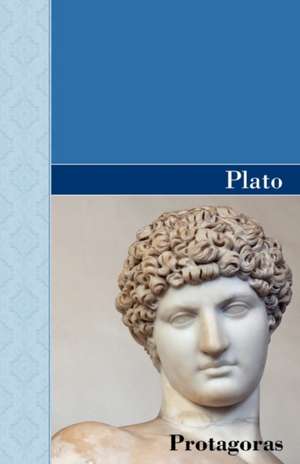Protagoras
Autor Platoen Limba Engleză Paperback – 11 noi 2009
| Toate formatele și edițiile | Preț | Express |
|---|---|---|
| Paperback (21) | 40.82 lei 22-36 zile | |
| CreateSpace Independent Publishing Platform – | 40.82 lei 22-36 zile | |
| Oxford University Press – 25 iun 2009 | 40.94 lei 10-16 zile | +12.63 lei 6-12 zile |
| – | 42.57 lei 22-36 zile | |
| CREATESPACE – | 44.54 lei 22-36 zile | |
| – | 45.36 lei 22-36 zile | |
| CreateSpace Independent Publishing Platform – | 45.36 lei 22-36 zile | |
| CREATESPACE – | 45.89 lei 22-36 zile | |
| CREATESPACE – | 56.06 lei 22-36 zile | |
| CreateSpace Independent Publishing Platform – | 67.19 lei 22-36 zile | |
| CREATESPACE – | 83.38 lei 22-36 zile | |
| Echo Library – 30 sep 2006 | 54.18 lei 38-44 zile | |
| Akasha Classics – 11 noi 2009 | 71.04 lei 43-57 zile | |
| Binker North – 27 aug 2023 | 76.56 lei 43-57 zile | |
| BLURB INC – 22 feb 2019 | 80.06 lei 17-23 zile | |
| Blurb – 21 aug 2022 | 81.65 lei 43-57 zile | |
| Book Jungle – 17 apr 2008 | 82.97 lei 43-57 zile | |
| TREDITION CLASSICS – 31 oct 2011 | 108.72 lei 43-57 zile | |
| Blurb – 11 feb 2019 | 113.46 lei 38-44 zile | |
| ALPHA EDITION – 10 dec 2024 | 118.48 lei 38-44 zile | |
| Bloomsbury Publishing – 30 aug 2001 | 164.50 lei 43-57 zile | |
| Clarendon Press – 5 dec 1991 | 310.38 lei 31-37 zile | |
| Hardback (1) | 159.05 lei 43-57 zile | |
| Akasha Classics – 11 noi 2009 | 159.05 lei 43-57 zile |
Preț: 71.04 lei
Nou
Puncte Express: 107
Preț estimativ în valută:
13.59€ • 14.23$ • 11.31£
13.59€ • 14.23$ • 11.31£
Carte tipărită la comandă
Livrare economică 31 martie-14 aprilie
Preluare comenzi: 021 569.72.76
Specificații
ISBN-13: 9781605125350
ISBN-10: 1605125350
Pagini: 108
Dimensiuni: 140 x 216 x 7 mm
Greutate: 0.15 kg
Editura: Akasha Classics
ISBN-10: 1605125350
Pagini: 108
Dimensiuni: 140 x 216 x 7 mm
Greutate: 0.15 kg
Editura: Akasha Classics
Descriere
Descriere de la o altă ediție sau format:
'You are going to entrust your soul to the care of a sophist. But I should be surprised if you even know what a sophist is.'In the fifth century BC professional educators, the sophists, travelled the Greek world claiming to teach success in public and private life. In this dialogue Plato shows the pretensions of the leading sophist, Protagoras, challenged by the critical arguments of Socrates. From criticism of the educational aims and methods of the sophists the dialogue broadens out to consider the nature of the good life, and the role of pleasure and intellect in the context of that life.The dialogue combines subtlety of argument with intricacy of dramatic construction and brilliant characterization. This translation achieves both precision and colloquial naturalness while the notes and introduction set the arguments in their historical and philosophical context. ABOUT THE SERIES: For over 100 years Oxford World's Classics has made available the widest range of literature from around the globe. Each affordable volume reflects Oxford's commitment to scholarship, providing the most accurate text plus a wealth of other valuable features, including expert introductions by leading authorities, helpful notes to clarify the text, up-to-date bibliographies for further study, and much more.
'You are going to entrust your soul to the care of a sophist. But I should be surprised if you even know what a sophist is.'In the fifth century BC professional educators, the sophists, travelled the Greek world claiming to teach success in public and private life. In this dialogue Plato shows the pretensions of the leading sophist, Protagoras, challenged by the critical arguments of Socrates. From criticism of the educational aims and methods of the sophists the dialogue broadens out to consider the nature of the good life, and the role of pleasure and intellect in the context of that life.The dialogue combines subtlety of argument with intricacy of dramatic construction and brilliant characterization. This translation achieves both precision and colloquial naturalness while the notes and introduction set the arguments in their historical and philosophical context. ABOUT THE SERIES: For over 100 years Oxford World's Classics has made available the widest range of literature from around the globe. Each affordable volume reflects Oxford's commitment to scholarship, providing the most accurate text plus a wealth of other valuable features, including expert introductions by leading authorities, helpful notes to clarify the text, up-to-date bibliographies for further study, and much more.
Notă biografică
Plato was an ancient Greek philosopher born in Athens during the Classical period in Ancient Greece. In Athens, Plato founded the Academy, a philosophical school where he taught the philosophical doctrines that would later become known as Platonism. Plato (or Platon) was a pen name derived, apparently, from the nickname given to him by his wrestling coach - allegedly a reference to his physical broadness. According to Alexander of Miletus quoted by Diogenes of Sinope his actual name was Aristocles, son of Ariston, of the deme Collytus (Collytus being a district of Athens).Plato was an innovator of the written dialogue and dialectic forms in philosophy. He raised problems for what later became all the major areas of both theoretical philosophy and practical philosophy. His most famous contribution is the Theory of forms, which has been interpreted as advancing a solution to what is now known as the problem of universals. He is also the namesake of Platonic love and the Platonic solids.His own most decisive philosophical influences are usually thought to have been, along with Socrates, the pre-Socratics Pythagoras, Heraclitus, and Parmenides, although few of his predecessors' works remain extant and much of what we know about these figures today derives from Plato himself.[a]Along with his teacher, Socrates, and his student, Aristotle, Plato is a central figure in the history of philosophy.[b] Unlike the work of nearly all of his contemporaries, Plato's entire body of work is believed to have survived intact for over 2,400 years.[6] Although their popularity has fluctuated, Plato's works have consistently been read and studied. Through Neoplatonism Plato also greatly influenced both Christian and Islamic philosophy (through e.g. Al-Farabi). In modern times, Alfred North Whitehead famously said: "the safest general characterization of the European philosophical tradition is that it consists of a series of footnotes to Plato.
Recenzii
`lucid, penetrating and philosophically interesting'M.C. Stokes, University of Durham
`excellent'W. Charlton, University of Edinburgh
`excellent'W. Charlton, University of Edinburgh





























